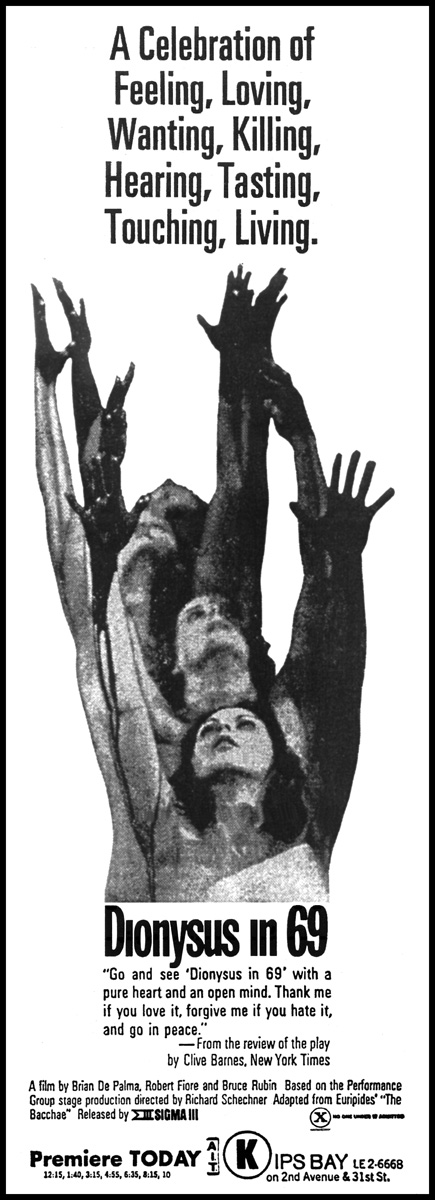|
DIONYSUS IN 69 (1970).
 In the late-'60s, up-and-coming filmmaker Brian De Palma attended this long-running Greenwich Village play and decided to preserve it on film, aided by co-directors Robert Fiore and Bruce Rubin. Thank god, because future generations won't believe that people once paid good money for this type of indulgent crap! Put on by The Performance Group theatre troupe, which included future PHANTOM OF THE PARADISE-star William Finley (who appeared in De Palma's 1962 student short, WOTON'S WAKE), Richard Schechner's avant-garde take on Euripides' 500 B.C. "The Bacchae" takes place in a theatre-in-the-round garage, with no sets and the audience squating wherever they can find a clean spot... Melding two different performances, the movie was shot on 16mm and 8mm b&w, with long handheld takes, but the most memorable element is its brilliant, beginning-to-end use of split-screen photography (which De Palma still relies on), capturing varying angles of the same moment, or totally different aspects of the freeform show. Filming a stage play is usually a dull endeavor, but the dual-images give it a wildly unpredictable energy, and De Palma later utilized a similar "total theater" experience for HI, MOM's blistering "Be Black, Baby" sequence. The cast's physical antics make the plot difficult to decipher, since the dialogue is secondary to writhing, topless actresses straddling bare-ass actors, or an invitation for the audience to join them in a sexy, ritualistic dance. Just as quickly, the cast puts on some clothes, gets (mildly) serious and returns to the storyline for a few minutes. When the King of Thebes, Pentheus (Bill Shephard) tries to stop Dionysus and his followers, all hell breaks loose, with Pentheus eventually torn to pieces. But in this somewhat-loose adaptation, Dionysus also gives Pentheus instructions on how to felate him. Meanwhile, De Palma and Fiore's cameras occasionally pans across the audience, who seem stunned, confused or bored. Thank goodness for William Finley, who's the only one clued into the absurdity of it all, playing the horny god Dionysus. First seen in only a jock-strap, the skinny, bespectacled Finley mixes his bizarre monologues with personal insights and biographical info, smirking and cracking jokes, intentionally calling Penteus by the actor's real name, and even announcing his candidacy for President. It's an incredible performance, and it's no wonder De Palma continued to cast him whenever possible. As a whole, the film is a fascinating relic, yet despite a few outlandishly effective moments, it's guaranteed to induce an 85-minute headache in all but the most tolerant fans of experimental theatre or Brian De Palma.
In the late-'60s, up-and-coming filmmaker Brian De Palma attended this long-running Greenwich Village play and decided to preserve it on film, aided by co-directors Robert Fiore and Bruce Rubin. Thank god, because future generations won't believe that people once paid good money for this type of indulgent crap! Put on by The Performance Group theatre troupe, which included future PHANTOM OF THE PARADISE-star William Finley (who appeared in De Palma's 1962 student short, WOTON'S WAKE), Richard Schechner's avant-garde take on Euripides' 500 B.C. "The Bacchae" takes place in a theatre-in-the-round garage, with no sets and the audience squating wherever they can find a clean spot... Melding two different performances, the movie was shot on 16mm and 8mm b&w, with long handheld takes, but the most memorable element is its brilliant, beginning-to-end use of split-screen photography (which De Palma still relies on), capturing varying angles of the same moment, or totally different aspects of the freeform show. Filming a stage play is usually a dull endeavor, but the dual-images give it a wildly unpredictable energy, and De Palma later utilized a similar "total theater" experience for HI, MOM's blistering "Be Black, Baby" sequence. The cast's physical antics make the plot difficult to decipher, since the dialogue is secondary to writhing, topless actresses straddling bare-ass actors, or an invitation for the audience to join them in a sexy, ritualistic dance. Just as quickly, the cast puts on some clothes, gets (mildly) serious and returns to the storyline for a few minutes. When the King of Thebes, Pentheus (Bill Shephard) tries to stop Dionysus and his followers, all hell breaks loose, with Pentheus eventually torn to pieces. But in this somewhat-loose adaptation, Dionysus also gives Pentheus instructions on how to felate him. Meanwhile, De Palma and Fiore's cameras occasionally pans across the audience, who seem stunned, confused or bored. Thank goodness for William Finley, who's the only one clued into the absurdity of it all, playing the horny god Dionysus. First seen in only a jock-strap, the skinny, bespectacled Finley mixes his bizarre monologues with personal insights and biographical info, smirking and cracking jokes, intentionally calling Penteus by the actor's real name, and even announcing his candidacy for President. It's an incredible performance, and it's no wonder De Palma continued to cast him whenever possible. As a whole, the film is a fascinating relic, yet despite a few outlandishly effective moments, it's guaranteed to induce an 85-minute headache in all but the most tolerant fans of experimental theatre or Brian De Palma.
© 2003 by Steven Puchalski.
|